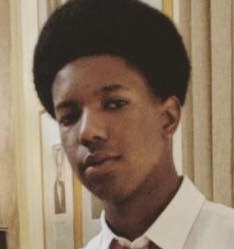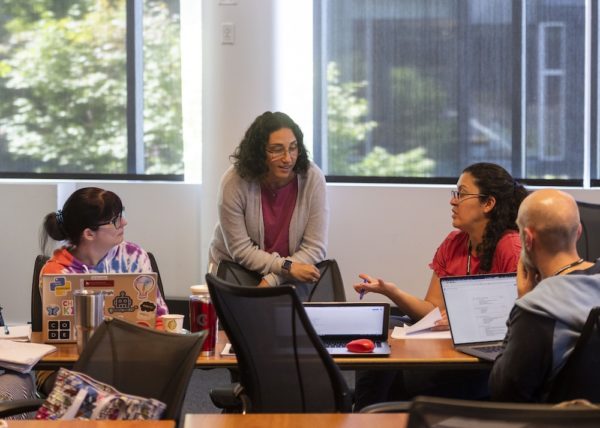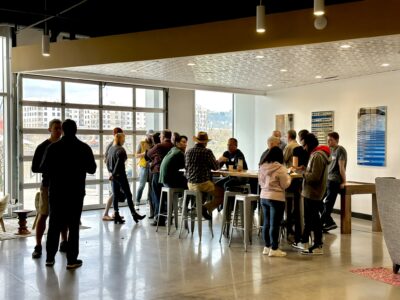
This editorial article is a part of Tech Education Month 2022 of Technical.ly's editorial calendar. This month’s theme is underwritten by Verizon 5G. This story was independently reported and not reviewed by Verizon before publication.
The computer and IT industry is expected to grow by 13% by 2030 — the fastest of any other US employment category — with a projection to add almost 670,000 new jobs. Yet with that growth comes a likely talent gap. How are middle and high school preparing students to enter these promising professions?
One local solution: a “crash course in artificial intelligence” offering teachers both technical know-how and a community of support as they build out lesson plans.
Hosted by Carnegie Mellon University’s School of Computer Science from June 27 to July 1, the workshop introduced Pittsburgh-area teachers to AI education and gave them a chance to collaborate in building course material and demonstrations they can bring to their classrooms this fall. The course was led by Stephanie Rosenthal, Ph.D. and Patrick Virtue, Ph.D., both professors at the university.
The 28 teachers in attendance heard from industry leaders across a range of AI-related fields including reps from SAMS Academy, CMU’s CS Academy and Girls of Steel Robotics. Participants spent the first three days learning through hands-on activities and instruction about topics related to AI from machine learning, including search and recommendation systems. The final two days were spent in groups where teachers developed lesson plans with the support of their peers and CMU faculty.
Sabrina Shaner, a business and technology teacher at downtown Pittsburgh’s City Charter High School, is creating an elective course on AI. She praised the generosity of her peers, CMU, Rosenthal and Virtue who shared resources to benefit the community of educators bringing AI to their schools.
“You go to professional development as teachers regularly, and this professional development has been the most beneficial one I’ve gone to in years,” Shaner told Technical.ly. “I learned a lot. I’ve gotten a lot of resources that I can take and make my own and create something that will be usable in my school in the short term, and also built relationships that hopefully will extend beyond this class.”
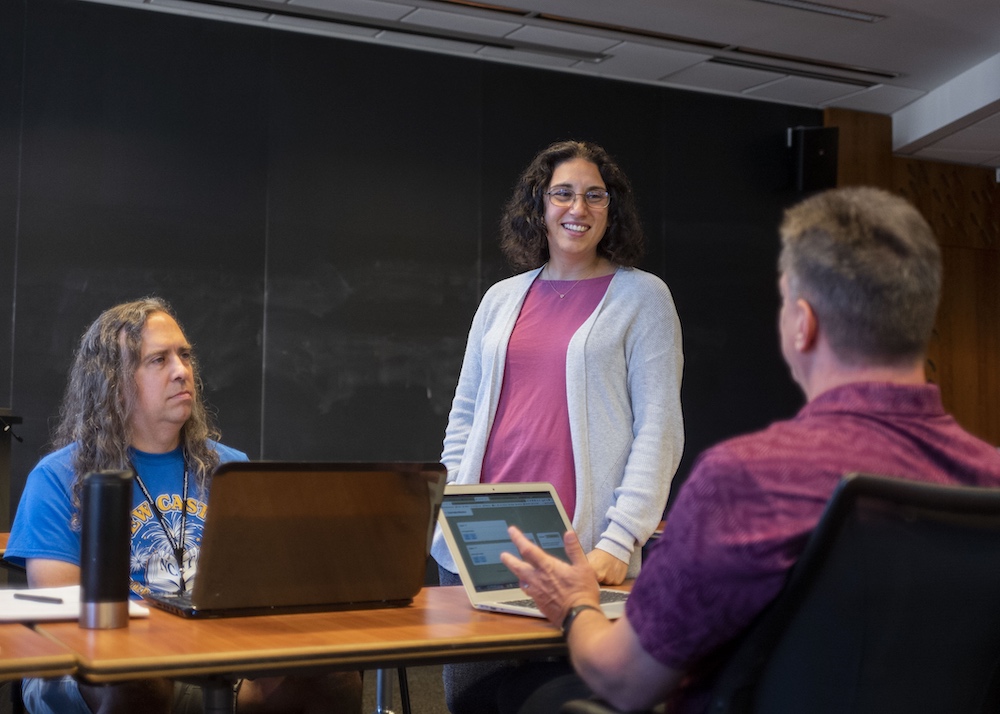
Stephanie Rosenthal works with teachers to develop lessons and activities to better teach the basic concepts of artificial intelligence to students during the “crash course in artificial intelligence at CMU. (Photo courtesy of Carnegie Mellon University)
Over the last decade, the workshop’s principal organizer, Rosenthal, has watched the technology industry boom, and as a professor, she’s excited seeing her students build impactful careers within the field. This crash course was exciting to her because it presented the chance for other educators to share the same mission.
“This week has been really uplifting to see the teachers really get it and appreciate the effort and the work that’s gone into helping them understand AI,” she said, “but also to give them the tools to teach it themselves.”
Some of these teachers looking to introduce AI to their schools previously felt alone in their journey. By the end of the workshop, they developed a support network.
“In the first couple days, a lot of them were like. ‘I guess we’re just gonna have to do this ourselves. If we want AI in our school we’re going to have to do it ourselves,'” Rosenthal said. “Hopefully by the end of this week — and certainly it sounds like — a lot more of them know that they’re in it together. We can support each other as we try to help students understand AI that they’re currently consuming to help them become better consumers and potentially creators of that technology in the future.”
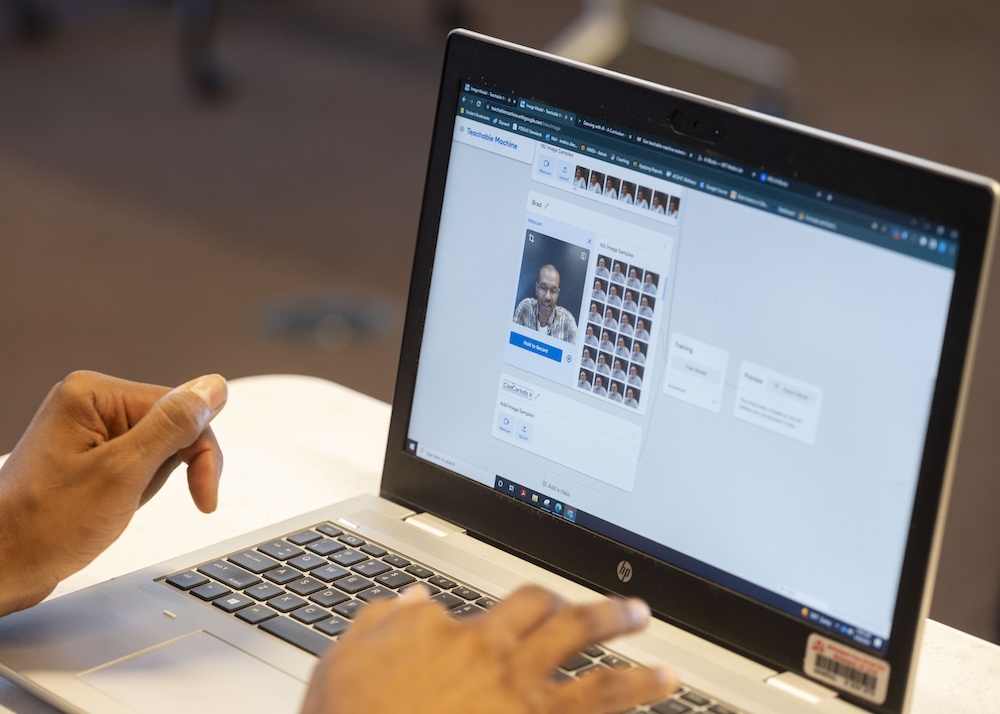
Teachers use Google’s Teachable Machine to learn about machine learning models. (Photo courtesy of Carnegie Mellon University)
Organizers and attendees alike recognize that they are not only teaching potential industry leaders but a diverse population of students, who will frequently interact with AI, regardless of career path. Whether in the form of GPS programs that know when a user is going to a certain place or streaming services that recommend shows based on user preferences, the technology is present in all of our lives.
That’s why Brian Herrig, a seventh and eighth grade technology education teacher at Canonsburg Middle School, emphasized the importance of teaching students to recognize how AI’s impact.
“The big goal with teaching middle school is not that you’re making them an expert in it, but that you’re giving them an awareness of it and exposure to it so that if they experienced it, they at least can have some informed thoughts about it,” Herrig said. “But also, as they move to high school and post-secondary, it gives them a chance to potentially explore that as a future interest area for additional coursework or possibly even a major or a career.”
The teachers who attended the crash course in AI came from 24 middle and high schools in the Pittsburgh region, and per CMU, at least a third of those schools serve communities that are underrepresented in the tech industry. Besides support from CMU’s computer science department, the free program is sponsored by the National Science Foundation and the Grable Foundation.
Join the conversation!
Find news, events, jobs and people who share your interests on Technical.ly's open community Slack
